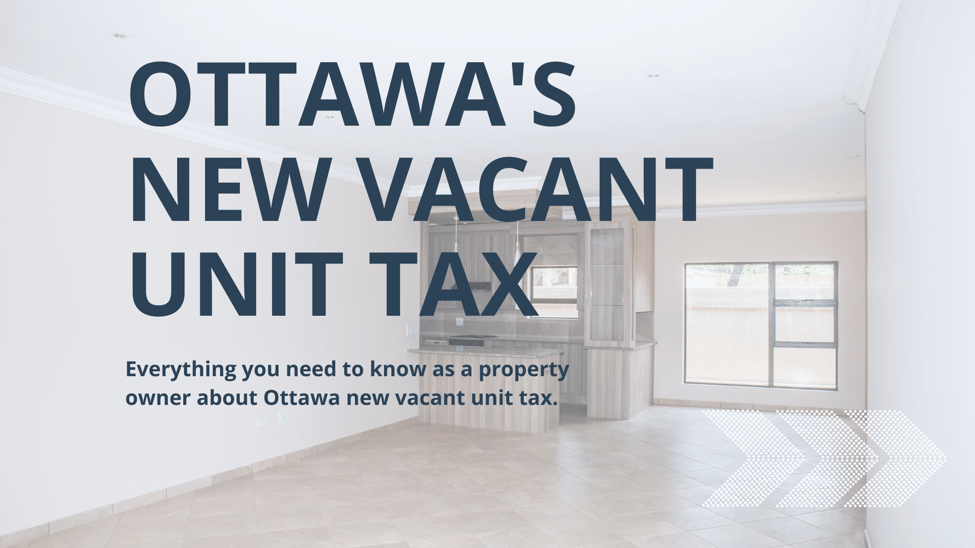The Vacant Unit Tax is a way for the City to generate revenue, as well as address the issue of housing affordability. According to the 2016 census, there were nearly 12,000 vacant units in Ottawa, and this number has likely grown in recent years. These vacant units are not only a missed opportunity for residents in need of housing, but they also contribute to a lack of community feel and social cohesion.
The Vacant Unit Tax will be imposed at a rate of 1% of the property's assessed value, and will be collected annually. The tax will apply to both residential and commercial properties, and will be phased in over a two-year period. In the first year, the tax will be applied to properties that have been vacant for more than 183 days, and in the second year, the tax will be applied to all properties that are vacant at any point during the calendar year.
The City has stated that the revenue generated from the Vacant Unit Tax will be used to fund affordable housing initiatives. This is a positive step towards addressing the issue of housing affordability in Ottawa, as it will not only encourage property owners to put their units on the market, but it will also generate revenue that can be used to create new affordable housing options.
One concern with this new tax is that it may disproportionately affect low-income property owners. The City has stated that it will provide exemptions for property owners who are experiencing financial hardship, as well as for those who have units that are in the process of being renovated or sold. Additionally, the city will be offering a rebate program for property owners who rent out their units at below-market rates.
Another concern is that the tax may discourage property owners from investing in Ottawa's housing market. However, the City has stated that it will work closely with property owners to ensure that the tax is implemented in a way that is fair and equitable. The City will also be offering resources and support to property owners who are looking to rent out or sell their units.
Overall, the City of Ottawa's new Vacant Unit Tax is a step in the right direction towards addressing the issue of housing affordability. By encouraging property owners to put their units on the market, it will increase the availability of housing for residents in need. Additionally, the revenue generated from the tax will be used to fund affordable housing initiatives, which will have a positive impact on the community as a whole.
It is important to note that Vacant Unit Tax is becoming a popular trend in North American cities. Toronto, Vancouver and Hamilton are among the cities that have implemented similar taxes. These taxes are designed to address the housing crisis and to encourage property owners to put their units on the market. It is a way for cities to generate revenue and address the issue of housing affordability at the same time.
It will be interesting to see the outcome of this new tax in Ottawa and how it will impact the housing market. The City has stated that it will closely monitor the tax and make adjustments as necessary. In the meantime, property owners in Ottawa should be aware of the Vacant Unit Tax and plan accordingly.
Submitting your declaration form:
If you are a property owner in Ottawa, it is important to understand how to submit the declaration form for the Vacant Unit Tax. Here are the instructions:
- Obtain the declaration form: The declaration form can be obtained by visiting the City of Ottawa website or by contacting the City's Revenue Services department.
- Fill out the form: The declaration form will ask for basic information about the property, such as the address, property type, and the name and contact information of the property owner. It will also ask if the property was occupied for 183 days or more in the calendar year.
- Submit the form: The declaration form can be submitted online, by mail, or in person. Online submission is the recommended way, if you have an access to the city's portal. If submitting by mail, be sure to include all required documents and to send the form to the correct address. If submitting in person, bring the completed form and required documents to the Revenue Services office.
- Pay the tax: If the property was vacant for more than 183 days in the calendar year, the property owner will be required to pay the Vacant Unit Tax. The tax will be imposed at a rate of 1% of the property's assessed value and will be collected annually. The city will send a notice of assessment to the property owner, which will include information on how to pay the tax.
- File for an exemption or rebate: Property owners who are experiencing financial hardship, or who have units that are in the process of being renovated or sold, may be eligible for an exemption from the Vacant Unit Tax. Additionally, property owners who rent out their units at below-market rates may be eligible for a rebate on the tax. The city has resources and support to help property owners file for an exemption or rebate.
It is important to note that property owners are responsible for ensuring that the declaration form is submitted on time. Failure to submit the form may result in penalties and interest charges. The City will be closely monitoring the Vacant Unit Tax and property owners should stay informed of any updates or changes to the tax.
It is always better to consult with the local authorities in case of any doubt or question, as the process may vary depending on the location. The city of Ottawa Revenue Services can provide you with more information and guidance on how to submit the declaration form for the Vacant Unit Tax.

